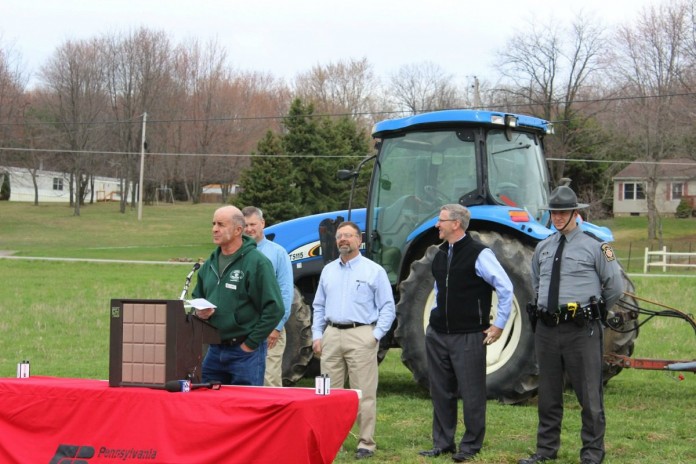EVANS CITY, Pa. — As planting season approaches, Pennsylvania officials reminded both motorists and farmers to be mindful of one another on the road.
Patience is more than a virtue when it comes to driver safety this time of year, according to each of the speakers at a news conference April 14 at Soergel Orchards Farm, which introduced Rural Roads Safety Week across the state.
“A lot of times, it doesn’t even involve the machine,” said Ronald Kesten, a Pennsylvania State Police trooper from Troop D in Butler.
Larry Voll, host farmer for the event, agreed. He said his farm has been fortunate to not have any road-related accidents at either of its locations, in Evans City, in Butler County, and near Wexford, in Allegheny County.
“We’re not as rural here as in some parts of the state, which makes it worse yet,” Voll said. “Our other farm is near the (Interstate) exit and there is a lot of traffic there. And with a lot of equipment, like a loaded hay wagon, you can’t see much.”
He added that wide turns made onto and off a farm itself can often create the most dangerous driving situations for farmers and motorists.
“People just need to be aware that we are just doing a job and we’re only going to be on the road for a short time,” Voll said. “If we have an opportunity to pull off somewhere safely, we will. But even though we realize we are slowing you down, it’s normally only about the equivalent of two traffic lights.”
Spreading the message
The Rural Road Safety Week effort is a partnership between the Pennsylvania Farm Bureau and the state departments of agriculture, police and transportation. The program was broadened 11 years ago with similar efforts by county Farm Bureaus, many of which still take place.
Pennsylvania Farm Bureau President Rick Ebert, a Westmoreland County dairy farmer, said that while most motorists realize farm machinery is only moving at approximately 25 miles per hour, the short time in which that distance can be covered by a car is sometimes misleading.
When combined with larger farm equipment, increased speeding, and distracted driving, Ebert said, this can be a recipe for roadway disaster.
Kesten pointed out it is legal for farm equipment to travel on public roadways, and all motorists must recognize and obey slow-moving-vehicle emblems on farm equipment.
From a citation standpoint, Kesten said, all crashes are equal, but it when it comes to potential damage and injury, that’s not the case.
“This is big, heavy equipment and a car is not designed to withstand that kind of impact,” he said. “And a lot of times, with Amish (buggies and farm equipment) for instance, it’s the other way around — the equipment is smaller.”
Crash statistics
Russell Redding, acting Pennsylvania Department of Agriculture secretary, said there were 101 crashes and seven fatalities involving farm equipment in the state in 2014, based upon PennDOT figures.
Overall, PennDOT reported 51,676 crashes on rural roads last year, with 762 fatalities.
“Some weeks ago, I was traveling across the state and got behind a manure pumper,” Redding said, noting the experience can be a frustrating one for anyone. “As ag producers, we know we need to be patient. But we need everyone to work together.”
Bob Bieber, who works on the farm nest to Soergel Orchard, came to the news conference — arriving, appropriately on a tractor — after hearing about it on a local Butler radio station.
“I’m surprised there aren’t more people here,” Bieber said. “Safety is important, and I thought there would be a lot of people.”










